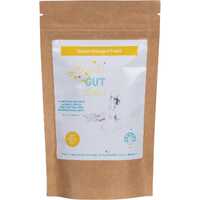One area of health that so many people take for granted, or simply overlook is gut health. When most people think of optimal health, they tend to think about things like body weight, cholesterol levels, and blood pressure.
While these are definitely markers of health, they are not the only things that influence your day to day well-being. In this regards, gut health is of extreme importance.
Why is it so important and what can you do to optimise your own gut health? Let’s take in consideration some important connections that will demonstrate the key role that gut health plays in overall health and well-being.
The Gut-Immune Connection
What many people do not realise is that their gut and immune system are rigidly connected. In fact, up to 70% of your immune system is located in your gut, so when your gut isn’t healthy, your immune defenses are basically down.
This is going to make you more prone to falling ill, either catching the common cold or flu or suffering from other health conditions. The stronger your gut is, the better you’ll be able to fight back if an invading bacteria or virus does enter the picture.
The Gut-Nutrient Deficiency Connection
One very important and crucial role that your gut plays is in helping to breakdown and utilise the foods you eat. When your gut is in good health, you’ll be able to efficiently absorb all the vitamins, minerals, and antioxidants from the foods you eat.
This in turn helps you sustain optimal health, avoiding symptoms that are associated with nutritional deficiency. If you’re going to put a lot of time and effort into eating the right foods – cutting out all junk and nutrient devoid foods, and replacing them with healthy and nutritious options - you'd definitely want to make sure that you're getting the best results from doing so. That means ensuring your gut is in good standing.
The Gut-Energy Connection
Along with absorbing all the nutrients from the foods you eat, a well-functioning gut is also going to do a better job at breaking down the energy these foods provide, helping you feel your best on a day to day basis.
For instance, If you’ve ever complained that you feel sluggish and fatigued during the day, it may not be your actual diet that's the culprit but rather, your gut health. If your gut health is out of sync, there's a good chance that it's the problem.
I come across so many people who start making changes in their diets – they add or cut back their carbohydrate intake trying to 'perfect' the energy equation when really, it isn’t their carbohydrate intake having an impact at all.
The Gut-Brain Connection
Then there’s the all-important gut-brain connection. Did you know that your memory can actually be impacted by the state of your gut? It’s true. When you have the right level and type of probiotics in the gut, this may help to improve memory and reduce the onset of age-related cognitive decline.
This isn’t to say that if your gut is healthy you’ll never suffer from not knowing where you put your keys, but you definitely can give your brain a boost if you’re taking care of those good bacteria.
Research published in the Frontiers in Cellular Neuroscience has shown that the right probiotics may help to prevent the development of Alzheimer’s disease.
Optimising Your Gut
So as you can see, maintaining a healthy gut is critical to your well-being. What’s the best way to achieve a great gut environment? Here are a few of the key steps that you should take.
- Improve your stress response. If you aren’t practicing good stress management techniques, now is the time to start. High levels of stress can be very detrimental to your gut health.
- Eat foods rich in probiotics. Certain foods contain more probiotics than others and should be included as part of your regular diet. Such foods include miso, kombutcha, sauerkraut, and sea vegetables.
- Get enough sleep. Lack of sleep will hamper your overall gut health and lead to lower levels of probiotics.
- Try and reduce how much sugar you’re consuming in your daily diet plan. Sugar is what the bad bacteria in your gut feed on and therefore can start to overpower the good, healthy bacteria that are growing.
- Focus on adding some prebiotic foods to your diet – which are like nourishment for the probiotics living in your gut. Good foods include pineapples, garlic, and onions.
- Consider cutting back on your total intake of grains and processed foods as these create an inflammatory response in the body that can also reduce overall gut health.
- Get regular exercise. Exercise does your entire body good – both mind, muscles, and gut.
- Avoid alcohol as much as you can. Alcohol is a toxin and will disrupt each and every system in your body.
Too many people take gut health lightly, and as you can see from the few points above, it's not a very wise thing to do - especially considering the influence your gut has on your entire well-being. Fortunately, with a few smart lifestyle changes, gut health is something that you can easily improve upon and start reaping the benefits.
References: Bhattacharjee, Surjyadipta, and Walter J. Lukiw. "Alzheimer's disease and the microbiome." Frontiers in cellular neuroscience 7 (2013).
...and remember, qualified nutritionists at Healthy Being are available to offer further general advice to help guide you in selecting the right products. So please, feel free to contact us at any time!
 Dr Peter Succar heads up the Product Research Team at Healthy Being and is an enthusiastic Health & Fitness Lifestyle Coach. He's passionate about helping others obtain optimum health, advocating realistic and achievable changes in diets and lifestyles that promote the body’s natural immunity, its ability to self-heal and achieve overall mental and physical well-being.
Dr Peter Succar heads up the Product Research Team at Healthy Being and is an enthusiastic Health & Fitness Lifestyle Coach. He's passionate about helping others obtain optimum health, advocating realistic and achievable changes in diets and lifestyles that promote the body’s natural immunity, its ability to self-heal and achieve overall mental and physical well-being.


 Certified Organic
Certified Organic Vegan Friendly
Vegan Friendly  Vegetarian
Vegetarian Organic Ingredients
Organic Ingredients Dairy Free
Dairy Free Gluten Free
Gluten Free Keto Friendly
Keto Friendly































